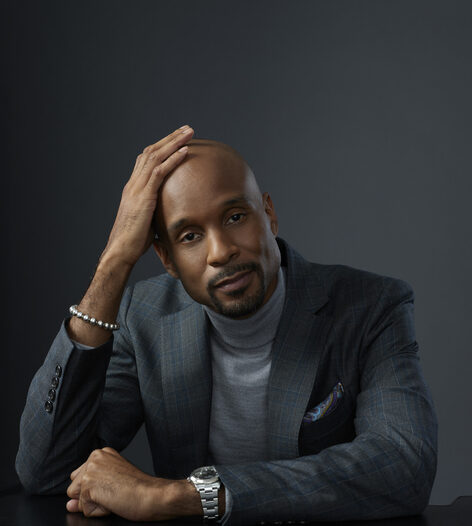(NEW YORK) — The principle and act of journalism has evolved into a more nuanced subject. With more resources available, more people have access to report news and give their own opinions on topics. With that being the case, one may consider the following questions: What is a journalist? And who is considered one?
Bomani Jones is one answer to those questions. Jones is a podcast and TV host for ESPN and HBO MAX. He has covered sports for over 15 years. He can be seen contributing to major media outlets and publications about trending topics in sports.
Jones is known for giving informed, but witty takes that offer his audience a fresh perspective. He is often seen speaking on race within sports. This can be seen on his show, “Game Theory with Bomani Jones.” Just like what is seen in the show, Jones exhibits the qualities of a journalist described in Bill Kovach and Tom Rosenstiel’s book, “The Elements of Journalism.”
Jones best displays his journalistic skills when he makes sense of something that he is covering, like his coverage of YouTube star and professional boxer, Jake Paul. He talked about the star’s popularity amongst his young audience and how he’s been successful in parlaying his success into boxing and now into his new business venture, Betr.
Paul said Betr was making sports betting more accessible to his younger audience.
“It’s sort of the TikTokification of sports betting,” Paul said during an interview on Fox Business Network.
Jones disagreed with Paul’s sentiment of making sports betting easier and suggested that Paul could be a catalyst for the potential danger of young people getting into gambling due to the addictive quality of gambling and social media.
“It’s like crackifying candy,” Jones said on his show.
Jones then interviewed Paul on the show and brought up his perspective in real time. What seemed like a normal interview, quickly turned contentious. While Jones simply asked fair questions, Paul felt that Jones had an underlying agenda to make him look bad.
“I get that you’re trying to be like a hero here. Like save the day, like paint me in a bad light,” Paul said.
In Jones fashion, he started laughing at the accusation of what seemed, to him, ridiculous.
“Ain’t nobody trying to fool you, Jake. I’m asking you a real question,” Jones said. Jones proceeded to logically break down why he asked such a question to help Paul see where he was coming from.
After Jones’ last question, Paul had enough.
“I’mma be honest bro. I don’t know who the fuck you are,” Paul said. Words between the two were exchanged as the interview abruptly ended with Paul closing his laptop.
It’s imperative to highlight that Jones stayed professional as much as he could. He brought a perspective that challenged his guest. Instead of giving into the verbal boxing match that Paul wanted, he stuck to his own script. But Jones did sneak in a jab.
“I’ve interviewed bigger motherfuckers than Jake Paul,” he said to Paul.
Jones has a very unique style. But he is able to adhere to the elements of Kovach and Rosenstiel’s book. The fifth element, “It Must Serve as an Independent Monitor of Power,” was displayed during the Jake Paul interview. Also, it’s displayed when Jones covers the NFL, NBA, and other athletes.
Jones’ show keeps topics relatable to his viewers to make his theories digestible. To do that, he uses the perspective of the everyday citizen with public interviews on topics he’s covering. This can be attributed to the sixth element, “It must provide a forum for public criticism and compromise.” Other than Jones, the show brings on other journalists and public figures to share their thoughts.
In the most recent episode, Jones spoke with ESPN’s Stephen A. Smith about the significance of speaking on stories that do not necessarily focus on sports. For example, the killing of Tyre Nichols by Memphis police officers.
“It’s immense, but it’s something we signed up for. I don’t get to run from it and neither do you,” Smith said.
Jones’ show thrives on an entertaining style of journalism. It may not be the first destination for viewers to get their news, but it’s a show people go to make sense of it. The show is not breaking news. But as mentioned earlier, it still contains journalistic elements that still fit the practice.
Jones has a voice and platform that not many Black people have. He uses it to share perspectives that are shared amongst many Black people. He exercises his journalistic duties and relates stories back to his audience which paints a clear picture for them. That is what a journalist is supposed to do.


